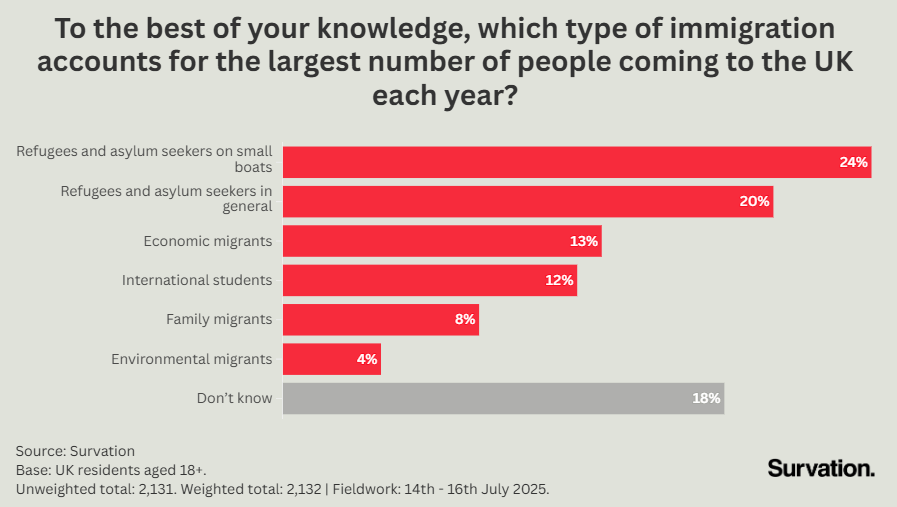
Myth, reality, and perception: the strengthening of British anti-immigration attitudes
In politics, rhetoric really can shape reality. Hardened by the years of scapegoating and fearmongering, Brits have become resolute: there is no scenario where they deem small boat crossings to be acceptable.
Even in scenarios where a refugee was said to be fleeing war or persecution, a plurality still deemed it unacceptable for them to attempt a small boat crossing, with 47% and 50% being of that view, respectively.
This lack of empathy is potentially driven by the perception of 44% of the public that refugees and asylum seekers contribute the most to the UK’s immigration numbers – with 24% identifying those arriving on small boats specifically.
Such results are startling, given that just 2% of immigrants arriving in the UK come on small boats and only 16% were refugees or asylum seekers overall in 2024. Conversely, the numbers of study and work visas granted in the year ending March 2025 totalled over 700,000 – accounting for 83.5% of all new arrivals. In our results, only a quarter of the population thought that students and economic migrants contributed the most to the UK’s immigration figures.
Away from small boats, British attitudes appear slightly more amenable to formal asylum applications, though they remain broadly opposed on the whole. Almost half of the population think the UK should accept asylum applications in scenarios where there is a risk of death (35% think the application should be rejected), and two-fifths feel asylum applications should be accepted when there’s a risk of persecution (42% believe the application should be rejected).
Other scenarios given received strong majorities in favour of rejecting asylum applications. It is hard not to reach a morbid conclusion from the data: a refugee has to be at risk of death for a plurality of Brits to support their asylum application. Even then, a third would still reject it.
However, when considering their own right to move freely abroad if they wish, the largest proportion of our sample agreed that they have such a right (44% compared to 40% who disagreed).
Whilst Tory and Reform voters narrowly disagreed with Brits having that right, large numbers still concurred, with 43% of the former and 44% of the latter agreeing that Brits can move freely if they desire. These two groups, on the other hand, were even opposed to accepting asylum applications when there was a risk of death – 50% of Conservatives and 59% of Reform voters would reject the asylum application of a refugee who risked death by going back to their country of origin. Clearly, the perceived rights of British citizens are not extended to others, no matter their circumstances.
Cognitive dissonance, contradictions, and close-contests: ways forward in British immigration discourse
Rhetoric around immigration has taken public attitudes and perceptions down an erroneous and often morally-dubious path. Our understanding of the nature of UK immigration has become divorced from reality; our sentiment towards those fleeing death, war, and persecution has morphed into suspicion and, in many cases, outright hostility.
Something has to give and the present trajectory need not be exacerbated. There is obviously scope for positive, pro-immigration voices to enter the fray. Such alternative visions and messaging could simply start by adding a dose of reality to the current debate: small boat arrivals are a vanishingly small proportion of the UK’s total immigration numbers and most people coming here want to study, work, and contribute. As a next step, a narrative of empathy could be built, one that highlights the unimaginable suffering that forced many to seek refuge and asylum in the UK to begin with. Finally, this new discursive strand could expose the contradiction. If you think Brits have the right to move freely, why shouldn’t others?
All is not lost. But anti-immigration rhetoric has been left to fester for too long and has reached a fever-pitch. The time for optimistic, pro-immigration narratives that are grounded in evidence is now.
—
GET THE DATA.
Survation conducted an online poll of 2,131 residents aged 18+ in the UK on their views on immigration. Fieldwork was conducted between 14th – 16th July 2025. Tables are available here.
________________________________________
Survation. is an MRS company partner, a member of the British Polling Council and abides by their rules. To find out more about Survation’s services, and how you can conduct a telephone or online poll for your research needs, please visit our services page.
If you are interested in commissioning research or to learn more about Survation’s research capabilities, please contact John Gibb on 020 3818 9661, email researchteam@survation.com, or visit our services page.
For press enquiries, please call 0203 818 9661 or email media@survation.com
< Back

